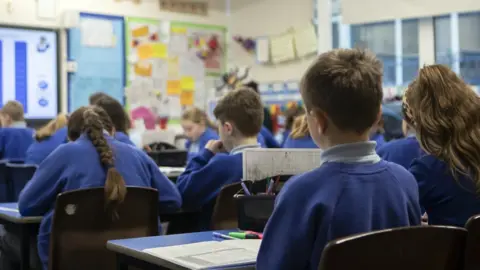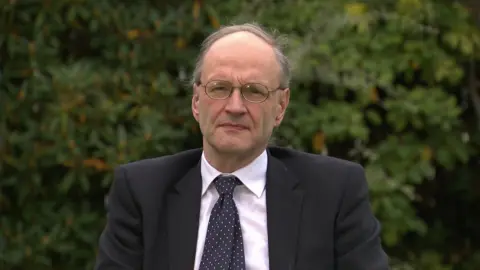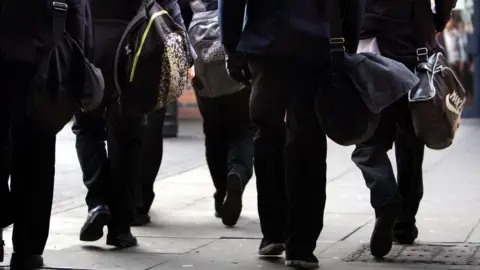NI schools: £180m needed to tackle educational underachievement
 PA Media
PA MediaThe Department of Education needs to spend more than £180m on widespread measures to tackle educational underachievement over the next five years.
All children should also go to pre-school for at least four and a half hours a day.
There needs to be significantly more investment in early years education.
Those are some of the actions recommended in a wide-ranging report, called A Fair Start.
The report, from an expert panel set up by the Education Minister Peter Weir in 2020, looks into the links between persistent educational underachievement and socio-economic background.
The research had been a commitment in the New Decade New Approach (NDNA) agreement.
Mr Weir described it as "one of the most important reports I have overseen in my time as education minister".
The panel was expected to look particularly at the "long-standing issues facing working class Protestant boys" and come up with an action plan to tackle underachievement.
However, the Fair Start report said underachievement affected all communities and "the most significant differences are between the GCSE attainment of free school meal-entitled (FMSE) and non-FSME pupils, irrespective of religion, gender or ethnicity".
 Getty Images
Getty ImagesBut it recommended a number of actions to help boys, who it said could face alienation from school, a lack of role models and lack a sense of belonging.
It called, for instance, for more investment in youth work in Protestant working class areas and said schools in disadvantaged areas should to be funded to run more extra-curricular activities.
The report also said more male teachers were needed, especially in primary schools.
"For a number of years, the issue of educational underachievement has been an area that I have been personally committed to addressing so this is a very significant day for me," said the education minister.
"I concur with the panel that the actions set out in the Action Plan are capable of making a real and significant impact on children's learning.

"We need to give our young people confidence, instil within them self-belief that they can succeed and provide the support they need to thrive in school."
Mr Weir added that the "crucial work" of the panel provides a "road map" for how we can achieve all these things.
Setting up the panel in 2020, Mr Weir said underachievement by some pupils remained "entrenched" in Northern Ireland despite significant funding and policies to tackle it.
The Northern Ireland Audit Office, however, previously said the Department of Education (DE) could not demonstrate that almost £1bn funding to help disadvantaged children had made a difference.
A previous large-scale report for the Executive Office examining the effects of deprivation on educational achievement published in 2017 was critical of academic selection.
The expert panel said there was evidence preparation for the transfer test "skews" teaching in the later years of primary school.
"Transfer outcomes for free school meal-entitled (FSME) pupils are significantly lower than for non-FSME pupils, leading to significantly lower percentages of FSME pupils attending grammar schools," the report said.
The panel said the arrangements for transfer between primary and post-primary schools should be reviewed by DE.
 PA
PAFull-time pre-school
They also said there needed to be much more focus on children's education from birth.
"There is a substantial body of research evidence which highlights that children's early experiences have a profound and lasting impact on their future learning and development," the report said, "which confirms that investing in quality early childhood education for disadvantaged children has significant and long-term benefits for individuals and society."
One of their recommendations is that all children attend full-time pre-school for at least four and a half hours a day.
They said research suggested children who attended pre-school full-time had better "literacy, language, maths, socio-emotional development and physical health, had increased school readiness skills".
The report said, though, staff in pre-school and early years "were struggling to cope with the number of children who had special educational needs or, more commonly, were awaiting assessment to confirm special educational needs".
'Exacerbated existing challenges'
The panel also called for more investment in children's emotional and mental wellbeing to reflect the level of need.
They also said the Covid-19 pandemic and children being out of school for prolonged periods was likely to have "exacerbated the existing challenges faced by many children and young people".
BBC News NI has previously reported on significant waiting times for Children and Adolescent Mental Health Services (CAMHS), for example.
Other areas covered by the panel's extensive report included the need for more links between schools and local communities and more professional development for school staff.
The panel recommended 47 actions needed to address educational underachievement at all levels at a cumulative cost of over £180m over the next five years, though the report also recommends many of the actions continue beyond that.
The expert panel was chaired by Dr Noel Purdy from Stranmillis University College.
Other members were former principal Kathleen O'Hare, the chief executive of the Greater Shankill Partnership Jackie Redpath, the head of Belfast Boys' Model Mary Montgomery and the head of Long Tower Primary School Joyce Logue.
Their final report is based on evidence from almost 350 school leaders, parents, officials from government departments, community organisations, assembly members, teaching unions and others.
